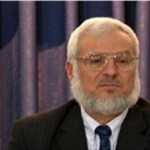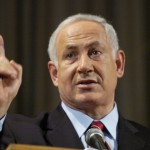Tuesday
Jan262010
Palestine: Conflicting Statements from Hamas on Israel's Right to Exist
 Tuesday, January 26, 2010 at 7:01
Tuesday, January 26, 2010 at 7:01  Following a meeting in Hebron with British millionaire David Martin Abrahams on Wednesday, Aziz Dwaik, a Hamas senior representative and the elected speaker of the Palestinian Legislative Council in the West Bank, said that Hamas has accepted Israel’s right to exist and would be prepared to alter its charter.
Following a meeting in Hebron with British millionaire David Martin Abrahams on Wednesday, Aziz Dwaik, a Hamas senior representative and the elected speaker of the Palestinian Legislative Council in the West Bank, said that Hamas has accepted Israel’s right to exist and would be prepared to alter its charter.There have been two developments since then. Firstly, there have been contradictory signals from Hamas, with some officials saying the group accepts the two-state solution but only as a temporary measure and others declaring that they accept Israel's right to exist and want dialogue.
Mahmoud Ramahi, another top Hamas operative in the West Bank, said that his movement was indeed willing to accept an independent Palestinian state within the pre-1967 lines, but only on a temporary basis and without recognizing Israel's right to exist.
Ghazi Hamad, a senior Hamas representative in the Gaza Strip, confirmed that his movement was considering the possibility of changing its charter. In an interview with the Saudi daily Okaz, Hamad said that the Hamas charter, like any other document, may be subject for changes and discussions. However, Hamad also stressed that "accepting" Israel did not mean that Hamas would "recognize" the Jewish state.
In contrast, Salah Bardaweel, a Hamas legislator and spokesman from the Gaza Strip, said that his movement was not seeking the destruction of Israel. Bardaweel spoke to a Hamas-affiliated Web site:
There is a huge difference between our demand to restore the Palestinian people's rights and the annihilation of Israel. We haven't said that [we want] to destroy Israel, but we are striving to restore our people's rights and refugees' right to return to their dwellings and land from which they were deported.
Meanwhile, the rival Palestinian organisation Fatah tried to exploit Hamas' apparent concession to Israel.. "The true face of Hamas has finally been exposed by Dwaik's remarks to the British millionaire," said Ahmad Assaf, a spokesman for Fatah in the West Bank. Asaf continued:
Hamas is seeking recognition of the international community at the expense of the Palestinians' interests and national rights. In one voice directed toward our people and Arabs and Muslims, Hamas is saying that it's a resistance movement. In another voice directed toward the international community, Hamas is talking about its readiness to recognize Israel and accept a long-term hudna [temporary truce].
At the same time, a senior Palestinian Authority official in Ramallah condemned initiatives by some EU citizens and officials to talk to Hamas, accusing them of "ignoring the fact that Hamas had staged a coup in the Gaza Strip". He said:
Meetings between Hamas and Westerners is undermining efforts to achieve reconciliation between Hamas and Fatah. Those who are trying to legitimize Hamas are harming the Palestinian Authority and any chance of achieving peace with Israel.
The Palestinian Authority has also sent an aggressive signal, as security agents on Sunday arrested six men who work as aides to Dwaik. The Hamas representative condemned the arrest of his aides as "an act of piracy" and "an assault on his parliamentary immunity". He also warned that the arrests could harm efforts by some Arab countries to achieve "national reconciliation" between Hamas and Fatah.




